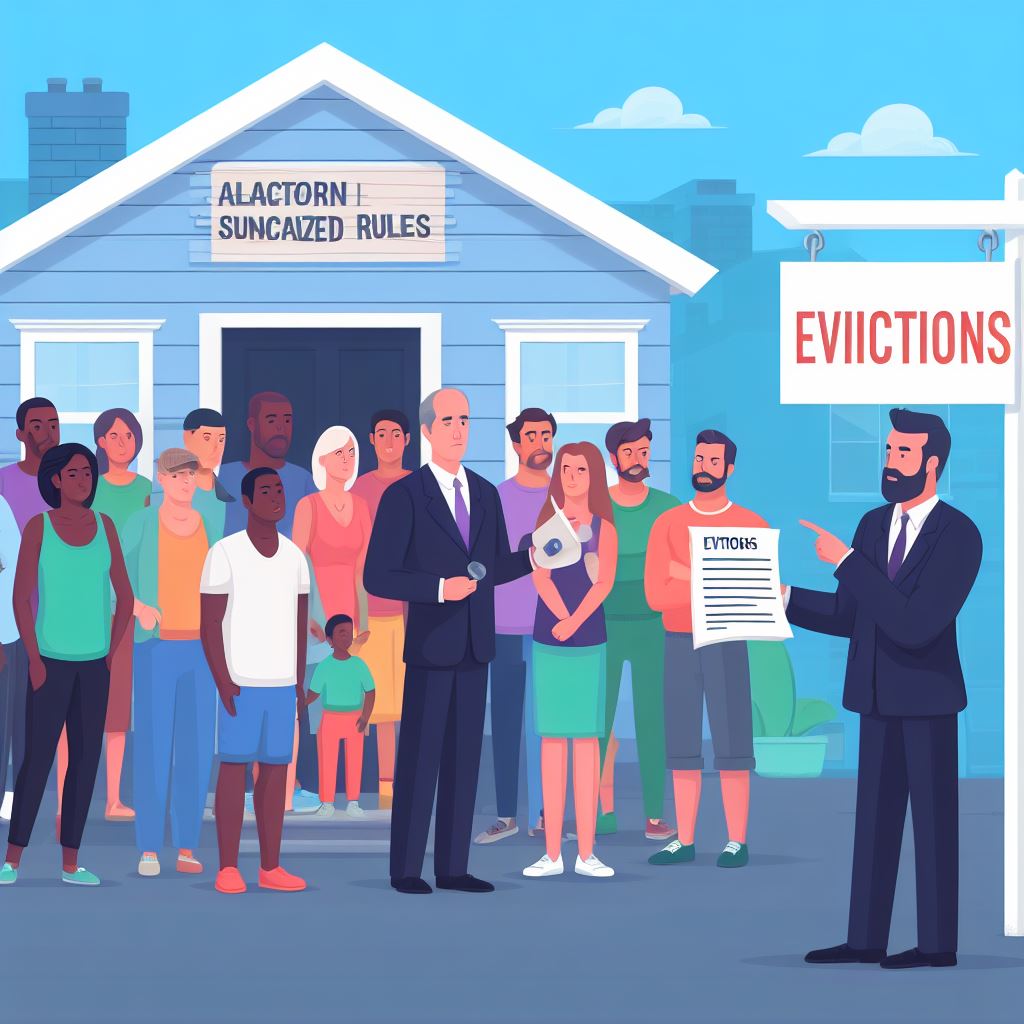13 Key Rules for Evictions in Subsidized Housing

So, you’ve found yourself in subsidized housing and things aren’t going as smoothly as you hoped. Don’t worry, we’ve got you covered.
In this article, we’ll walk you through the 13 key rules for evictions in subsidized housing. From nonpayment of rent to violation of lease terms, we’ll break down the process and your rights every step of the way.
So sit back, relax, and let us guide you through this often complex and overwhelming maze.
Key Takeaways
- Regularly review eligibility to avoid housing assistance disruptions.
- Communication is crucial when unable to pay rent on time.
- Understand rules surrounding lease violations to avoid consequences.
- Promptly report prohibited behavior or illegal activities.
Eligibility for Subsidized Housing
You should regularly review your eligibility for subsidized housing to ensure you continue to meet the requirements. Eligibility for subsidized housing is based on various factors, including income, household size, and citizenship or immigration status.
To qualify for subsidized housing, your income must fall within the designated income limits set by the housing authority. These income limits vary depending on the size of your household and the specific program you’re applying for.
It’s important to note that even if you initially qualify for subsidized housing, your eligibility may change over time. This could happen if your income increases or if there are changes in your household composition. Therefore, it’s essential to review your eligibility on a regular basis to avoid any potential issues or disruptions in your housing assistance.
If your circumstances change and you no longer meet the eligibility requirements, you may be required to seek alternative housing options or face the risk of eviction. By staying informed about your eligibility status, you can take the necessary steps to maintain your subsidized housing and ensure its continued support for you and your family.
Nonpayment of Rent
If rent isn’t paid on time, it can result in eviction from subsidized housing. Nonpayment of rent is a serious issue that can have severe consequences for tenants in subsidized housing. Here are some key points to keep in mind:
- Communication is crucial: If you’re unable to pay your rent on time, it’s important to communicate with your landlord or housing authority immediately. They may be able to work out a payment plan or connect you with resources that can help.
- Know your rights: Familiarize yourself with the rules and regulations regarding nonpayment of rent in your specific subsidized housing program. Understanding your rights and responsibilities can help you navigate the situation more effectively.
- Seek assistance if needed: If you’re facing financial hardship and struggling to pay your rent, there may be local organizations or government agencies that can provide assistance. Look into rental assistance programs or organizations that offer financial counseling.
Violation of Lease Terms
When lease terms are violated in subsidized housing, it can result in eviction. It’s important to understand the rules surrounding lease violations to avoid facing the consequences. Violation of lease terms can encompass a wide range of actions, including but not limited to, unauthorized occupants, failure to maintain the unit, engaging in criminal activities, and breaching community rules.
Unauthorized occupants refer to individuals living in the unit who aren’t listed on the lease agreement. This violation can occur when tenants allow friends or family members to move in without notifying the housing authority. Similarly, failure to maintain the unit involves neglecting the responsibilities outlined in the lease agreement, such as keeping the premises clean and in good condition.
Engaging in criminal activities can also lead to eviction. This includes drug-related offenses, violence, or any other illegal activities that jeopardize the safety and well-being of other residents. Additionally, breaching community rules, such as excessive noise or improper disposal of trash, can be considered lease violations.
When lease terms are violated, the housing authority typically initiates an eviction process. This may involve issuing a notice to cure or quit, allowing the tenant a specific period to rectify the violation or vacate the premises. If the tenant fails to comply, the housing authority may proceed with a formal eviction, which could result in the termination of the lease and the removal of the tenant from the subsidized housing program.
It is crucial to familiarize yourself with the specific lease terms and rules established by the housing authority to avoid unintentional violations. By adhering to these guidelines, you can ensure a peaceful and harmonious living environment in subsidized housing.
Illegal Activities
When it comes to illegal activities in subsidized housing, it’s important to understand the rules and consequences. As a tenant, you have the responsibility to report any prohibited behavior to the appropriate authorities.
Violating these rules can result in serious consequences, including eviction from your subsidized housing.
It’s crucial to abide by the law and maintain a safe and respectful environment for yourself and your neighbors.
Reporting Prohibited Behavior
You must promptly report any prohibited behavior or illegal activities that you witness in your subsidized housing unit. Reporting such activities is essential to maintaining a safe and secure living environment for all residents. By reporting prohibited behavior, you contribute to the overall well-being of your community and help ensure that everyone can enjoy their homes without fear or disruption.
Here are three reasons why reporting is crucial:
- Safety: Reporting illegal activities helps protect you and your neighbors from potential harm, such as drug-related incidents or violence.
- Legal Compliance: Reporting prohibited behavior ensures that the rules and regulations of your subsidized housing are upheld, preventing any potential legal consequences for yourself or others.
- Preservation of Resources: Reporting illegal activities helps prevent misuse of resources, such as unauthorized guests or illegal subletting, which can impact the availability of subsidized housing for those in need.
Consequences for Rule-Breaking
Reporting prohibited behavior and illegal activities in your subsidized housing unit is essential because it helps establish the consequences for rule-breaking, particularly regarding illegal activities. By reporting such activities, you play a crucial role in maintaining a safe and secure living environment for yourself and your neighbors. The repercussions for engaging in illegal activities within subsidized housing can be severe, as outlined in the table below:
| Illegal Activity | Consequences |
|---|---|
| Drug-related offenses | Immediate eviction, termination of rental assistance, potential arrest |
| Violent behavior | Eviction, termination of rental assistance, potential arrest |
| Criminal activity | Eviction, termination of rental assistance, potential arrest |
It is important to note that these consequences are in place to protect the well-being and safety of all residents. By adhering to the rules and promptly reporting any illegal activities, you contribute to the overall harmony and security of your subsidized housing community.
Nuisance and Disturbance
If a tenant in subsidized housing is found responsible for a certain number of nuisance or disturbance incidents, eviction may occur. Nuisance and disturbance are serious issues that disrupt the peaceful and safe environment of subsidized housing communities.
To help you understand the rules surrounding this subtopic, here are some key points to consider:
- Definition: Nuisance and disturbance incidents can include excessive noise, criminal activity, violence, harassment, or any behavior that negatively impacts the well-being and enjoyment of other tenants.
- Reporting: It’s important to report any nuisance or disturbance incidents to the property management promptly. This allows them to address the issue and take appropriate action.
- Consequences: If a tenant is found responsible for a certain number of nuisance or disturbance incidents, they may face eviction proceedings. The specific number of incidents and the severity of each case will vary depending on the housing authority’s policies and regulations.
Understanding the rules regarding nuisance and disturbance incidents is crucial to maintaining a harmonious living environment in subsidized housing. By being aware of what constitutes such incidents, promptly reporting them, and recognizing the potential consequences, you can contribute to a safe and enjoyable community for all residents.
Damage to the Property
To initiate eviction proceedings for damage to the property in subsidized housing, evidence of significant harm or destruction must be provided. It’s crucial to establish the extent of the damage caused and its impact on the property. This evidence can include photographs, repair estimates, or statements from maintenance staff or contractors. It’s essential to demonstrate that the damage wasn’t the result of normal wear and tear, but rather deliberate or negligent actions by the tenant.
When assessing the severity of the damage, the housing provider will consider factors such as the cost of repairs, the disruption caused to other residents, and the potential safety hazards. Minor damages, such as nail holes or scuff marks, are generally not sufficient to warrant eviction. However, more significant destruction, such as broken windows, holes in walls, or extensive water damage, can be grounds for eviction.
It is important to note that the housing provider must provide the tenant with an opportunity to respond to the allegations and present their side of the story. If the tenant can provide evidence to refute the claims or show that they weren’t responsible for the damage, eviction may be avoided. However, if the evidence supports the allegations and the tenant is found responsible for the significant harm or destruction, eviction proceedings may proceed.
Failure to Recertify Income
When assessing a tenant’s eligibility for subsidized housing, it’s crucial to ensure that they recertify their income in a timely manner. Failure to recertify income can have serious consequences, including eviction from the subsidized housing program.
Here are some key points to keep in mind regarding this issue:
- Timeliness is essential: It’s important for tenants to understand the deadlines for income recertification and submit the necessary documentation within the specified timeframe. Failure to do so can result in the termination of their subsidized housing benefits.
- Communication is key: Tenants should be informed about the recertification process and provided with clear instructions on what documents are required. Open lines of communication between tenants and housing authorities can help prevent misunderstandings and ensure compliance.
- Documentation matters: Tenants must provide accurate and up-to-date income information during the recertification process. Failing to provide complete and truthful documentation can lead to the termination of their benefits and potential eviction.
Unauthorized Occupants
One key rule to consider regarding unauthorized occupants in subsidized housing is the limitation on the number of individuals allowed to reside in the unit. Each subsidized housing program has specific occupancy standards that determine the maximum number of people who can live in a unit. These standards are designed to ensure the fair distribution of housing resources and to prevent overcrowding.
The purpose of limiting the number of occupants is to maintain the safety and livability of the unit. Overcrowding can lead to excessive wear and tear, increased utility costs, and potential health and safety hazards. By setting occupancy standards, subsidized housing programs aim to provide a suitable living environment for residents.
Unauthorized occupants refer to individuals who aren’t listed on the lease agreement or haven’t been approved by the housing provider to live in the unit. If unauthorized occupants are discovered, the housing provider may take legal action, which can lead to eviction proceedings.
Eviction notice requirements play a crucial role in the eviction process. Understanding these requirements is essential for both tenants and housing providers as they navigate the complexities of evictions in subsidized housing.
Eviction Notice Requirements
If unauthorized occupants are discovered in subsidized housing, you must be aware of the eviction notice requirements. Evicting tenants is a serious matter that requires following specific procedures to ensure fairness and legality.
Here are the key eviction notice requirements you should know:
- Provide written notice: The first step in the eviction process is to provide a written notice to the tenant informing them of the violation and the intention to evict. This notice must clearly state the reason for eviction and the timeframe for compliance or vacating the premises.
- Give sufficient notice period: The notice period required for evictions in subsidized housing can vary depending on state and local laws, as well as the specific circumstances. It’s crucial to adhere to the designated notice period to give the tenant adequate time to address the violation or find alternative housing.
- Use certified mail or personal service: To ensure proper delivery and documentation, eviction notices should be sent via certified mail or personally served to the tenant. Proof of delivery is essential to demonstrate that the notice was received by the tenant.
By understanding and following these eviction notice requirements, you can navigate the process smoothly and protect your subsidized housing property.
It’s advisable to consult with legal professionals or local housing authorities to ensure compliance with all applicable laws and regulations.
Right to a Hearing
When facing an eviction in subsidized housing, it’s crucial to understand your right to a hearing. This ensures fairness in the eviction process and allows you to present your case before a neutral decision-maker.
Due process rights are essential in protecting tenants from arbitrary or unjust evictions, and having the opportunity to be heard is a fundamental aspect of this.
It’s advisable to seek legal representation during the hearing to help navigate the complexities of the proceedings and advocate for your rights effectively.
Fairness in Eviction
You have the right to a hearing if you’re facing eviction in subsidized housing. This is an important protection that ensures fairness in the eviction process. Here are three key reasons why having a hearing is crucial:
- Opportunity to present your case: A hearing allows you to explain your side of the story and present any evidence or witnesses that support your defense. It gives you a chance to challenge the reasons for eviction and demonstrate why it shouldn’t proceed.
- Protection against arbitrary decisions: A hearing provides a formal process where an impartial third party can review the evidence and make a fair judgment. It helps prevent landlords from evicting tenants without valid reasons or following proper procedures.
- Preservation of due process rights: By granting you a hearing, the system upholds your fundamental right to be heard and have your case considered before any action is taken against you.
Having a hearing is just one aspect of the broader concept of due process rights in eviction proceedings.
Due Process Rights
The right to a hearing in subsidized housing evictions ensures fairness in the eviction process by providing tenants with an opportunity to present their case, challenge arbitrary decisions, and preserve their due process rights. This crucial step safeguards against potential abuses of power by landlords or housing authorities and allows tenants to defend themselves against eviction. During the hearing, tenants can bring evidence, present witnesses, and refute any allegations made against them. This process allows for a thorough examination of the facts and ensures that decisions are based on accurate information. The table below summarizes the key aspects of the right to a hearing in subsidized housing evictions:
| Key Aspects | Explanation |
|---|---|
| Opportunity to present case | Tenants are given a chance to explain their side of the story and provide evidence in their defense. |
| Challenge arbitrary decisions | Tenants can question the validity of the eviction and challenge any arbitrary or unfair actions taken by the landlord or housing authority. |
| Preserve due process rights | The right to a hearing ensures that tenants are afforded their constitutional rights and guarantees a fair and impartial process. |
Importance of Legal Representation
Legal representation is crucial in safeguarding tenants’ rights during the eviction process in subsidized housing. Hiring a lawyer can significantly increase your chances of successfully defending against an eviction. Here are three reasons why legal representation is important:
- Expertise and Knowledge: A lawyer specializing in housing law knows the ins and outs of eviction procedures and can navigate the complex legal system more effectively.
- Protection of Rights: A lawyer will ensure that your due process rights are upheld throughout the eviction process, including the right to a fair hearing and the right to present evidence and witnesses.
- Negotiation and Advocacy: A skilled attorney can negotiate with the landlord or housing authority on your behalf, potentially reaching a settlement or agreement that allows you to stay in your home.
By having legal representation, you can better understand your rights and have a strong defense against eviction.
Now, let’s move on to discussing tenant defenses against eviction.
Tenant Defenses Against Eviction
When facing eviction in subsidized housing, understanding your tenant defenses is crucial. As a tenant, you have certain rights and protections that can be used to defend your right to stay in your home. Here are a few common defenses that you should be aware of:
- Non-payment of rent: If you’re being evicted for non-payment of rent, you may have a defense if you can prove that you have paid your rent or that you have a valid reason for not paying.
- Failure to maintain the property: Landlords have a responsibility to keep the property in a habitable condition. If you can show that the landlord has failed to make necessary repairs, you may be able to defend against eviction.
- Retaliation: If you can prove that the landlord is trying to evict you in retaliation for exercising your legal rights, such as reporting code violations or requesting repairs, you may have a defense.
- Discrimination: If you believe that you’re being targeted for eviction based on your race, religion, gender, or other protected characteristic, you may have a defense under fair housing laws.
Remember, each case is unique, and the specific defenses available to you’ll depend on the circumstances. If you believe you have a valid defense, it’s important to consult with a lawyer who specializes in housing law to understand your rights and options.
Understanding your tenant defenses is just the first step in the eviction process. If your defense is unsuccessful, you may have the option to appeal the eviction. The appeals process will be discussed in the next section.
Appeals Process
If your defense against eviction in subsidized housing is unsuccessful, you can still pursue an appeal to challenge the eviction decision. The appeals process provides an opportunity for you to present your case to a higher authority and seek a reversal of the eviction order.
Here are a few key points to keep in mind if you decide to appeal:
- Review the timeline: Familiarize yourself with the deadlines for filing an appeal. Make sure you adhere to the specified timeframe to avoid any potential delays or complications in your case.
- Gather evidence: Compile all relevant documentation and evidence that support your claim. This may include witness statements, medical records, or any other information that can strengthen your appeal.
- Consult legal assistance: Consider seeking legal advice to help you navigate the appeals process. An experienced attorney can provide guidance, represent you in court, and increase your chances of success.
By understanding the appeals process and following these guidelines, you can effectively challenge the eviction decision.
However, if your appeal is also unsuccessful, you may need to explore other options, such as tenant relocation assistance, to ensure a smooth transition to a new living arrangement.
Tenant Relocation Assistance
To ensure a smooth transition to a new living arrangement, consider exploring the option of receiving tenant relocation assistance. This assistance can provide you with the necessary support and resources to help you find a new home and settle in comfortably. Here is a table that highlights the potential benefits of tenant relocation assistance:
| Benefits of Tenant Relocation Assistance | Emotional Impact |
|---|---|
| Financial support for moving expenses | Relieves stress |
| Help with finding suitable housing | Provides reassurance |
| Assistance with transferring utilities | Ensures convenience |
Frequently Asked Questions
Can a Tenant Be Evicted for Having Unauthorized Pets in Subsidized Housing?
Yes, you can be evicted for having unauthorized pets in subsidized housing. The rules clearly state that tenants must adhere to the terms of their lease agreement, which usually prohibits pets without prior approval.
What Are the Consequences for a Tenant Who Consistently Violates Noise Regulations in Subsidized Housing?
If you consistently violate noise regulations in subsidized housing, the consequences can be severe. You may face warnings, fines, or even eviction. It’s important to be considerate of your neighbors and follow the rules to avoid these outcomes.
Are There Any Exceptions to the Eviction Notice Requirements in Subsidized Housing?
In subsidized housing, there may be exceptions to the eviction notice requirements. It’s important to understand these exceptions so you can be prepared and know your rights as a tenant.
Can a Tenant Be Evicted if They Fail to Maintain the Cleanliness of Their Unit in Subsidized Housing?
You can be evicted in subsidized housing if you fail to maintain the cleanliness of your unit. It is important to keep your space clean to avoid violating the terms of your lease agreement.
Is There Any Financial Assistance Available for Tenants Who Are Facing Eviction From Subsidized Housing?
If you’re facing eviction from subsidized housing, there may be financial assistance available to you. Explore options like emergency rental assistance programs or legal aid organizations that can help you navigate the process and potentially avoid eviction.



